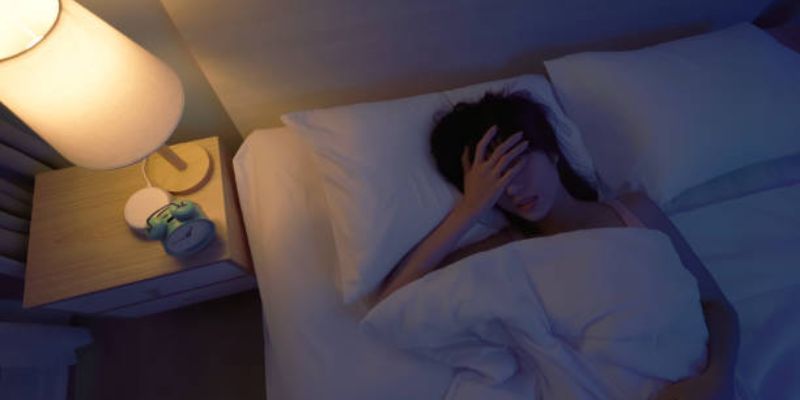Let's be honest: We've all done it. You're lying in bed, staring at the ceiling, your mind racing with tomorrow's to-do list, that awkward text you sent, or the bill you forgot to pay. Then Stress creeps in, and suddenly, sleep is impossible. But why does this happen? And even more important, how do we end it?
Stress and sleep are locked in a messy tango. Stress trades punches, and sleep gets thrown out the door. When sleep goes on, Stress has a total meltdown. It's a cycle that can seem impossible to break. But don't freak out—I'm here to help. So, let's look behind the science and talk about easy, natural solutions for getting shut-eye.
Stress is not just a mood killer — it's a sleep killer, too. Here's why: When stressed, your brain enters "fight or flight" mode. It's almost like a giant alarm clock for your body — Stress hormones like cortisol are released. But instead of unwinding your heart pounds, your muscles tighten, and your mind spins.

But wait, there's more. Stress doesn't just leave you sleepless — it hijacks your sleep cycles. Do you know that grogginess you feel when you wake up from a "full" night? That's because anxiety chops up your sleep into little fragments, with tiny interruptions called "microarousals." Now, picture your sleep as a film. Stress presses pause every 10 minutes. You never entirely salt, but the murder plot (your REM sleep) never gets to the bottom.
And the "sleep reactivity" trap. Some brains are so wired to freak out under Stress that falling and staying asleep are more arduous. It's like being born with a hyper-sensitive smoke alarm, with a high sensitivity that it goes off even when someone burns toast.
Here's the kicker: Missing sleep doesn't just make you tired—it makes Stress worse. When you're sleep-deprived, your brain's emotional control centre (the amygdala) goes into overdrive. Suddenly, minor stressors feel like emergencies and your coping ability plummets.
Cortisol — the same hormone that prevents you from sleeping — also increases when you do not sleep enough. It's the cruellest of loops: Stress →, crummy sleep →, increased cortisol → increased Stress. That can eventually jangle your whole sleep-wake cycle, a factor that can also make falling asleep more difficult , even on good days.
We cannot forget about the physical toll. Poor sleep festers your immune system, zaps your energy, and makes focusing difficult. Everyday tasks feel monumental, and then, you guessed it, the following create more Stress.
Want to combat Stress and sleep better? Hang in there while we explore science-based hacks that work. There are no pills or gimmicks—just easy, organic solutions.
Unplug Before Bed
Your phone is not your ally at night. The blue light emitted by screens tricks your brain into believing it is daytime, blocking melatonin (the sleep hormone). Implement a "digital sunset": Turn off screens an hour before bedtime. Pick a book, doodle, or look at the ceiling—anything other than scroll.

Try 4-7-8 Breathing
This hack seems super simple, but it works. Inhale for 4 seconds, hold for 7, exhale for 8. It lowers your heart rate and says to your brain, "Calm down." Bonus: You can do it in bed, which means it's ideal for an anxiety spiral at 3 a.m.
Sip Herbal Tea
Teas like chamomile and valerian root are like a warm hug for your nervous system. They are rich in compounds that enhance calming brain chemicals. Pro tip: A splash of milk — calcium helps your brain use sleep-friendly hormones.
Get Moving (But Not Too Late)
Exercise melts away Stress, but timing is essential. Working out in the morning or afternoon helps reset your sleep cycle. Evening gym sessions? They might amp you up. Leave Yoga or gentler stretching at night.
Write a “Worry List”
Stress likes to hide in the dark. Shine a light on it: Write a list of everything worrying you, taking up space in your mind. Keep a notebook by your bed. Once it's on paper, your brain can un-hyper (or at least simmer down).
Cool Your Room
To fall asleep, your body needs to drop 1-2 degrees. Turn the AC up, fan it out, or hang your feet over the edge of the blanket. Bonus: Cooler temps make for deeper sleep, so you’ll wake up less.
Try Lavender
Lavender is more than a Scent for boujee jar candles—it's a real-deal sleep aid. Spray it on your pillow, add it to a diffuser, or rub diluted oil on your wrists. Research shows that it reduces heart rate and anxiety.
Stick to a Schedule
Your brain loves routines. Go to bed and wake up simultaneously every day, including weekends. Consistency trains your internal clock so you can fall asleep quickly.
Eat Sleepy Snacks
Eating bananas, almonds, and oatmeal, rich in magnesium and melatonin, helps. Don't have big meals before bed; a small snack will help stabilize your blood sugar, avoiding those 3 a.m. wake-ups.
Work on Progressive Relaxation
Starting from your toes, tense and release each muscle group. This forces your body to differentiate between "tight" and "relaxed." By the time you reach your head, you'll be half asleep.

Ending the stress-sleep cycle isn't about doing things perfectly; it's about making small shifts you can stick with. Perhaps you begin with nighttime tea and a journal of worries. Or you can go out and buy blackout curtains. Every tiny step helps.
Sleep isn't a luxury, remember—it is your body's reset button. Doing so gives you the edge: You are sharper and calmer, prepared for whatever life throws you. So tonight, turn off the phone, breathe, and leave your brain alone.